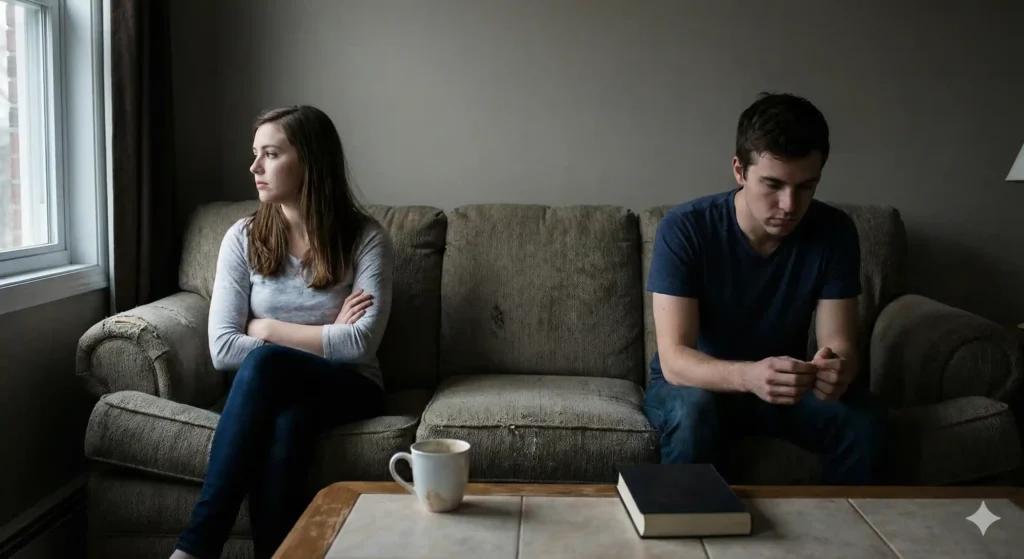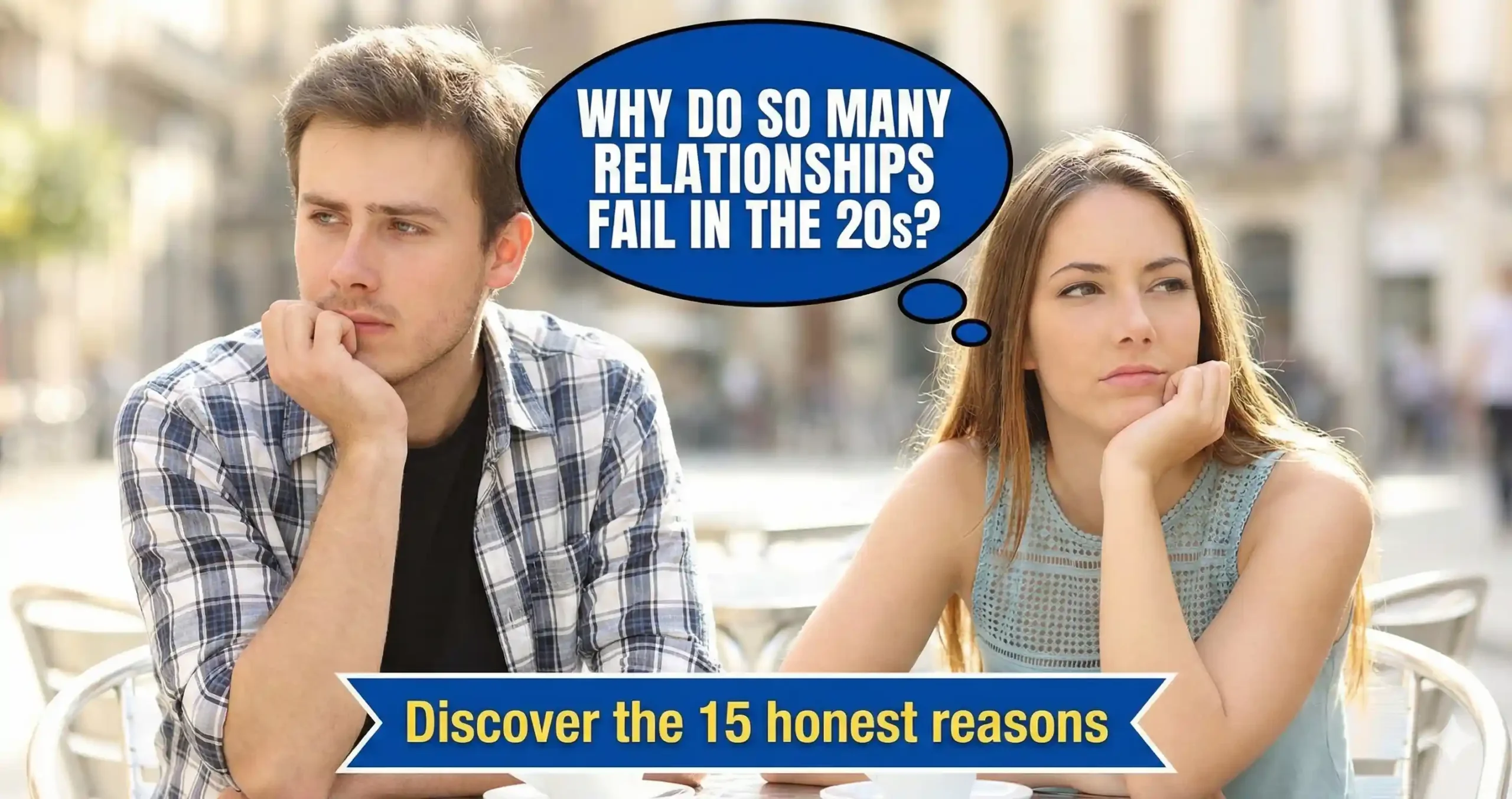Your 20s are a weird, beautiful, and terrifying decade.
You are technically an adult, but you often feel like a teenager with a credit card. You are building a career, discovering your identity, and trying to figure out if the person sleeping next to you is your “Forever” or just your “For Now.”
It is a statistical reality: Most relationships that start in your early 20s will not survive to see your 30th birthday.
Why? Is love dead? No.
But according to psychologists, the “Emerging Adulthood” phase involves so much rapid internal change that staying connected to another person feels like trying to hold hands while running on two different treadmills at different speeds.
At PairPulse, we analyze the patterns behind the heartbreak. Here are the 15 brutally honest reasons why relationships crumble in this decade—and the lessons you can salvage from the wreckage.

Phase 1: The Identity Crisis (Reasons 1-4)
The biggest killer of 20-something romance isn’t cheating; it’s growth.
1. The Prefrontal Cortex Gap
Here is some biology: Your brain doesn’t finish developing until age 25. Specifically, the prefrontal cortex—the part responsible for long-term planning and impulse control.
- The Breakup: The person you dated at 21 is literally not the same person you are at 26. Your values, taste in music, and political views rewire.
- The Lesson: Breaking up isn’t a failure; it’s often a symptom of growing up.
2. The “Growth Gap”
One partner gets a corporate job, starts reading self-help books, and wants to buy a house. The other partner is still living like a frat boy, prioritizing video games and happy hours.
- The Breakup: Resentment builds. The ambitious partner feels held back; the relaxed partner feels judged.
- The Lesson: You cannot drag someone into adulthood. They have to walk there themselves.
3. Identity Fusion vs. Individuation
In your early 20s, you might “merge” with your partner to feel safe. You eat what they eat, watch what they watch.
- The Breakup: Eventually, you suffocate. You wake up one day and ask, “Who am I without him/her?” You break up to find your own voice.
- The Lesson: Healthy relationships require two whole individuals, not two halves trying to make a whole.
4. The “Project” Partner
Many 20-somethings fall in love with potential. You date the guy who could be great if he just got a job. You date the girl who could be happy if she just went to therapy.
- The Breakup: You realize you can’t love someone into changing.
- The Lesson: Date people for who they are today, not who they might be in 5 years.
Gut Check: Are you outgrowing your partner? Are you holding onto potential instead of reality? Take our Should I Break Up? Quiz to see if your paths are permanently diverging.
Phase 2: The “FOMO” & Options Paradox (Reasons 5-8)
We live in the age of Tinder, Bumble, and Instagram. The illusion of infinite choice is a relationship killer.
5. “Grass is Greener” Syndrome
Social media shows you everyone else’s “perfect” relationships. You look at your partner, who is eating cereal in sweatpants, and think, “I could do better.”
- The Breakup: You leave a good 80% relationship to find the missing 20%, only to realize the grass was fake.
- The Lesson: Comparison is the thief of joy.
6. Sexual Experimentation & Curiosity
For many, their 20s are the prime time to explore sexuality. If you’ve only been with one person, curiosity can become a nagging itch.
- The Breakup: One partner wants to “sow their wild oats” or explore different dynamics (like polyamory) that the other isn’t comfortable with.
- The Lesson: Sexual compatibility matters, and suppressing curiosity often leads to infidelity.
7. The “Timeline” Clash
This hits hard in the late 20s (27-29).
- Partner A: Wants to travel the world and live in a van.
- Partner B: Wants a ring, a dog, and a baby by 30.
- The Breakup: Love is there, but the logistics don’t match.
- The Lesson: Love conquers all, except timing.
8. Digital Infidelity (Micro-Cheating)
It starts with a DM. Then a “work spouse.” Then hiding the phone.
In your 20s, the lines of fidelity are often blurred by digital access.
- The Breakup: Trust is eroded by a thousand small betrayals before a physical affair even happens.
- The Lesson: If you have to delete the message, you’re already cheating.

Phase 3: The “Real World” Pressures (Reasons 9-12)
Love is easy in college. Love is hard when rent is due.
9. Career Relocation
According to Pew Research Center, young adults are the most mobile demographic.
You get a dream job in New York. They get into grad school in London.
- The Breakup: Long-distance drains the romance. You drift apart.
- The Lesson: Sometimes, your career should come first in your 20s.
10. Financial Stress & Lifestyle Creep
One of you is a spender (YOLO mentality); the other is a saver (FIRE movement).
In college, being broke together was romantic. In the real world, it’s stressful.
- The Breakup: Constant fights about credit card debt and Uber Eats bills.
- The Lesson: Financial compatibility is just as important as romantic chemistry.
11. The “Party Phase” End Date
At 22, getting drunk every Friday is normal. At 28, it’s a red flag.
If one partner matures out of the party scene and the other is still doing keg stands, the connection breaks.
- The Breakup: “You’re boring” vs. “You’re immature.”
- The Lesson: Lifestyle habits must evolve together.
12. Lack of Conflict Resolution Skills
Most people in their 20s haven’t learned how to fight fair. They either scream (anxious attachment) or shut down (avoidant attachment).
- The Breakup: The relationship dies from “Death by a Thousand Cuts” because nothing ever gets resolved.
- The Lesson: Learning to say “I was wrong” is the most expensive skill you can acquire.
Phase 4: The Deep Stuff (Reasons 13-15)
These are the silent killers that often go unnoticed until it’s too late.
13. Unhealed Childhood Trauma
Your 20s are often when your childhood trauma starts to manifest in adult relationships.
- The Breakup: You project your issues with your parents onto your partner. You push them away before they can leave you.
- The Lesson: You have to heal yourself before you can fully love someone else.
14. In-Law & Family Friction
“I marry you, I marry your family.”
In your 20s, setting boundaries with overbearing parents is hard. If your partner always sides with their mom over you, the relationship will crack.
- The Breakup: You get tired of being second place.
- The Lesson: A united front is non-negotiable.
15. You Just… Fell Out of Love
This is the hardest one to admit. Sometimes, nobody did anything wrong. You just woke up one day, looked at them, and felt… nothing.
The spark faded, and you didn’t know how to reignite it.
- The Breakup: A quiet, sad ending.
- The Lesson: Love is a verb. It requires daily action, not just a feeling.
Is it just a rough patch or the end? If you are confused about whether your relationship has run its course or just needs work, check our Couple Compatibility Score. It helps you separate temporary boredom from fundamental incompatibility.

What You Can Learn (The Silver Lining)
If you are going through a breakup in your 20s, it feels like the end of the world.
But according to psychologists at Psychology Today, these breakups are necessary “data points.”
The 20s Breakup acts as a filter:
- It teaches you what you don’t want.
- It forces you to build your own independence.
- It prepares you for the person you will eventually build a life with.
Don’t regret the time spent. You didn’t waste years; you invested them in learning who you are.
Frequently Asked Questions (FAQs)
Is it normal to break up with a “perfect” person in your 20s?
Yes. Someone can be a perfect person but the wrong partner for you. If your gut says “this isn’t it,” listen to it. Staying out of guilt is a recipe for a messy divorce in your 30s.
Can we get back together in our 30s?
It happens, but don’t bank on it. Sometimes people need to grow apart to grow up. If you meet again down the road and the timing aligns, great. But don’t pause your life waiting for a sequel.
How do I know if I’m throwing away a good thing?
Look at your core values. Do you agree on money, kids, and communication? If yes, it might be worth fighting for. If no, you are just delaying the inevitable. Use our Should I Marry Him/Her? Quiz to test those core values.
Final Thoughts from Oliver
Your 20s are for making mistakes.
The relationships that end in this decade aren’t failures; they are the stepping stones that lead you to the person who sticks.
Cry it out. Pack the boxes. Block them on Instagram if you need to.
And then, take a deep breath. Your life is just beginning.
